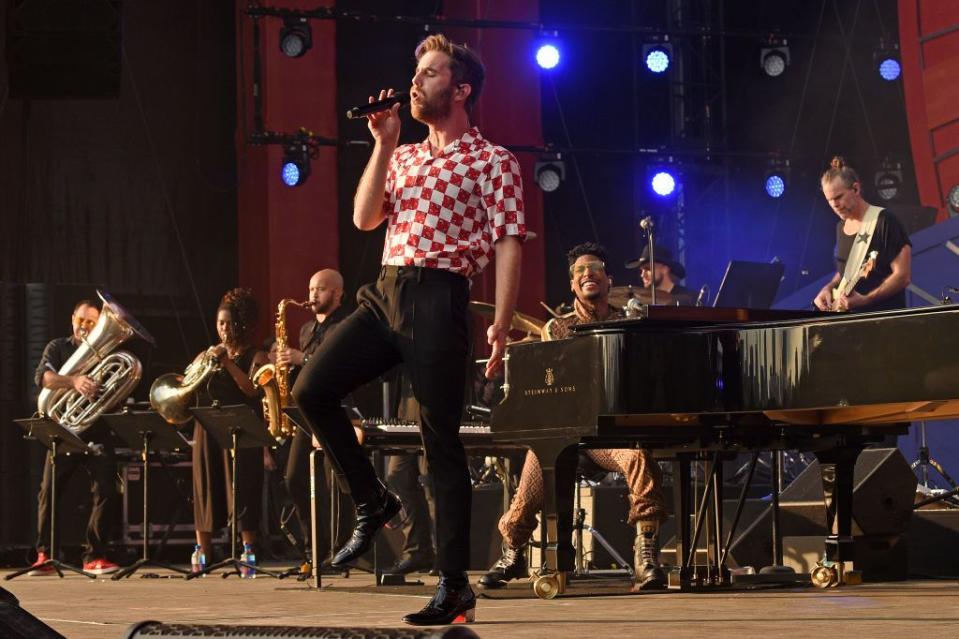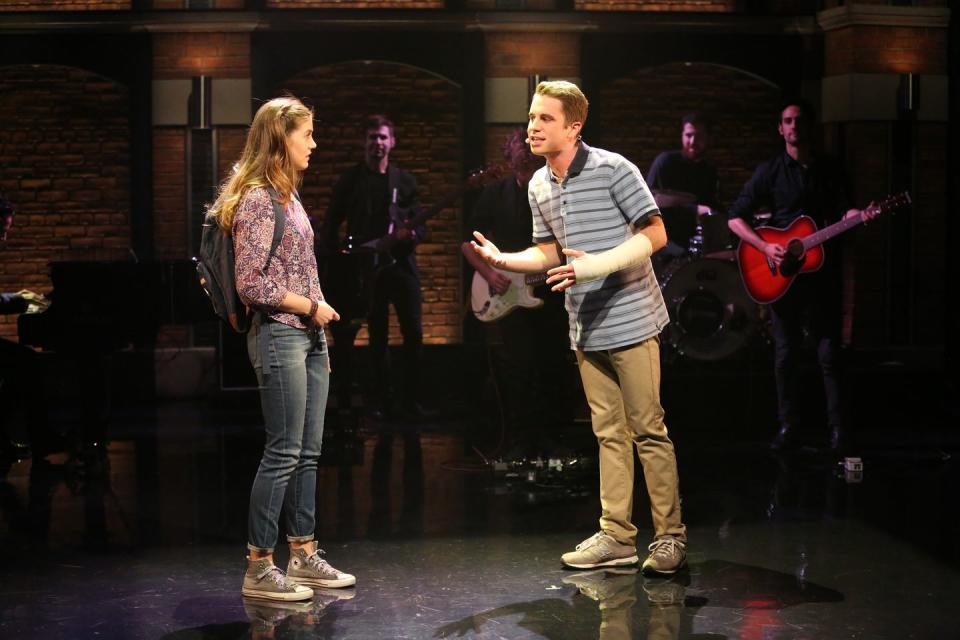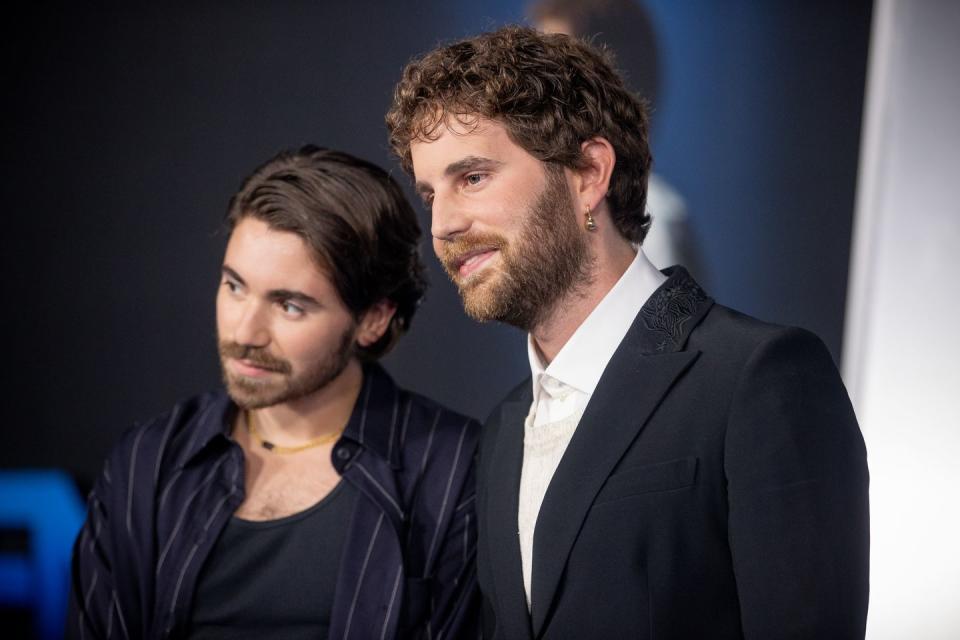The Worry and Joy of Being Ben Platt

Why is Ben Platt in my screening of Dear Evan Hansen starring Ben Platt?
I’m kneeling on the floor of the fancy Whitby Hotel screening room, frantically cleaning up the entire box of popcorn I’ve knocked over. That’s when I notice him. The lights dim as I pluck the last few kernels up, and I look up to see—is that? It is. It’s Ben freaking Platt claiming one of the bright orange seats in the back marked RESERVED. Of the 130 seats in the theatre, only a dozen or so are taken, one of them, now, by the star of Dear Evan Hansen, the film we’re about to see.
This is unusual. Unheard of, even.
Stars go to world premieres and film festivals, but not press screenings in Midtown on a Tuesday evening. Had he not seen the film? Is this a thing he does? Two hours and seventeen minutes later, it’s just as odd: As I turn around to see if I can make out Platt’s reaction to the applause, he is escaping out the back entrance of the theatre before the lights have even come up.
Platt waits anxiously in the corner behind the concession booth. He’s wearing a long beige button up, looking for someone. He locks eyes with the guy behind me. Platt grabs him by the shoulders, and pulls him in for a hug. Before their bodies meet, he asks, quite loudly, “What did you think?”
“Dude, it was incredible. I cried,” the guy says.
Platt pulls him closer.
I make my way to the hotel lobby and Platt is somehow already there—I never saw him pass me. I’m so confused by his presence that I linger, unsure if I’m supposed to introduce myself tonight or wait until our interview. He’s surrounded by people who take turns congratulating each other on the film. A man in a blazer says something to Platt who turns on his heels and clasps his hands together. “Thank you so much,” he says, quite loudly, and takes a gentle bow.
Two days later, I meet Platt at Hearst Tower. He’s sitting on a couch flanked by three members of his management team and a studio exec. When I suggest that we go somewhere more private, everyone seems immediately hesitant. But there’s a particular glint of panic in Platt's big, greyish eyes. Sometimes a subject may have a publicist around, but four people? That’s a damn book club. First he’s watching his own screening. Now he appears to be insulating himself during an interview. What exactly is there to be afraid of?
Because on the surface it would appear that he has nothing to be afraid of. Platt has been a Hollywood roman candle over the past decade. First known as the nerdy guy from Pitch Perfect, he landed the titular role in Dear Evan Hansen in 2015, which he performed eight times a week for over a year. He popped up in an Ang Lee film, Billy Lynn’s Long Halftime Walk. Richard Linklater has cast him in his next project as well. Producer/streaming wunderkind Ryan Murphy saw his performance as Evan Hansen and boom: Platt found himself starring alongside Gwyneth Paltrow in The Politician. (He’s the politician.)
Each project, bigger. The subsequent offers, more frequent.

And now, with an Emmy, a Grammy, a Tony, a Netflix concert special, and two albums under his belt, the show that launched him has been turned into a Hollywood movie starring Platt and Julianne Moore and Kaitlyn Dever. The movie we watched together—kind of—two days before.
In the weeks leading up to our interview, the internet skewered the trailer for Dear Evan Hansen. People picked at Platt’s curly hair. (Some said it was a wig—it isn’t.) Others joked that Platt, who turns 28 on the day of the film’s release, is too old to be playing a high schooler. The most painful comments suggested that the reason Platt got the role is because his father, Marc Platt, is the producer. That’s a lot to swallow, especially for a role that you’ve invested so much in. A role that’s come to mean so much.
So, yeah. Platt’s past few weeks have been… tenuous. But after a bit of nudging, he and I grab a couple bar chairs a few dozen feet away from his team.
“I was in the back, yeah, hiding. I had never seen the final cut,” he says of his surprise appearance at the screening. “I don't hate what I did, which is good. I'm glad now to know exactly what people are seeing. I don't have intentions of watching many other times, because I feel like now I know what's there.” The film, out on September 24, comes a month after Platt’s second album of original songs, Reverie, and the announcement of a 2022 tour.
It always comes back to Evan though. Counting previews, Platt has been performing as Evan Hansen off and on for seven years. That’s a quarter of his life spent refining the same character. In a way, then, this film is a farewell to Evan and a punctuation mark, signaling the start of something new.
Platt contorts his body, hunching his shoulders and crossing his legs in a way that makes it look like he’s folded in on himself. Pair that with a medical grade N-95 mask, and all you’re really left with are those grey eyes. They are Platt’s most distinctive physical feature—a bit sad and naïve, but not without at least the potential for joy.
Platt was invited to the very first reading for Evan Hansen the musical and remained with the production all the way to Broadway. The role earned him a Tony (at 23, the youngest to win lead actor in a musical) and a Grammy (for the original cast recording) and an Emmy (he performed pieces of the show on TV). The story follows Evan—an anxious, suicidal high schooler who gets caught up in a real mess when a bully steals a letter of positive affirmations that Evan has written to himself as a therapy exercise. The same day, the bully kills himself. The one clue as to why? A letter addressed “Dear Evan Hansen,” found among his belongings. That makes Evan his de facto "only friend," and for better or worse, Evan goes along with the botched assumptions of the bully’s parents.
He left the show in 2017 and was replaced by his long-time friend: a little-known actor named Noah Galvin. “Getting to take over for him was extremely daunting,” Galvin says with a laugh. “I was like, ‘There’s no world in which I would ever want to do that,’ because it took it out of him. It’s a really emotional arduous undertaking.” Three years later, the two started dating.
Then, as 2020 couples were wont to do, they moved into Platt’s childhood home with his parents to ride out the pandemic together. Platt says, “We were spending a lot of time together, and living in the same place, during a time that was already very emotionally intimate for everyone. But it turned into what made my pandemic have beauty in it.”

While talking about Galvin, Platt uncrosses his legs; his shoulders become less hunched. Galvin serves as inspiration for much of Reverie, a pop album that pairs 1980s synths with a twentysomething’s meditations on love and wisdom. Though the two spend much of their time apart now that quarantine restrictions have lifted (Platt has been promoting Evan Hansen; Galvin was recently named a series regular on The Good Doctor), the relationship survived that “zero to 60” throttling of living together. “I think with Noah, it’s like—separate from the romantic, physical aspects of the relationship—he’s just the person I want to be around the most,” Platt says, clutching his arm. “He's the person who makes me laugh the most, who I want to download things with when they happen.”
Platt only came out publicly in 2019 before the release of his song “Ease My Mind,” which features Platt in a sensual black and white music video alongside a male love interest. The coming out process, in his personal life, was relatively simple. Los Angeles-raised, accepting family, liberal circle of friends: gang’s all here. But as Platt describes it, the privilege can feel like a burden if he spends too much time in his head—and he spends a lot of time in his head. “As wonderful, and as grateful as I am for my privilege, I think that comes with this level of guilt that I have when I do still struggle with things like self-love and self-acceptance… I haven't had many instances where I've allowed myself to really delve deep with people, or connect very deeply,” he says, looking down at the ground for a moment before continuing. “If I didn't have any talent or ability or clout, or any of those things to offer, would I still be someone that people would find lovable, or find that they want to be around?”
Platt is talented—just watch his mesmerising cover of the obscure Billy Joel song “Vienna” on The Politician. And he does have clout—a film adaptation of Evan Hansen without him would have been strange, if not unthinkable. What’s the issue with all of that?
“I've been performing and singing and expressing myself as an artist since I was like six years old, and it's been such an integral part of my identity,” he explains. “I've relied so much on that world and that community… that the kind of aimlessness that would come along with losing that is a scary thing.” That’s a cycle that comes up a few times in our conversation: Platt qualifies how fortunate he is, explains how passionate he is about his work, then follows it up with a hypothetical of what might happen if it all went away.
“Ben is one of the most hardworking individuals I’ve ever bore witness to,” Galvin says. “To his own detriment, I’d say.”
Fortunately, nothing in his career has been called into question… until the Dear Evan Hansen trailer. “I think that it was a great learning lesson for me to put down my phone and re-immerse in the people that love me, who could care less if the movie exploded and flopped. That they'd still want to have dinner and spend time with me regardless,” he says, almost like a Dear Ben Platt affirmation. “But of course, it is painful. It’s heartbreaking to hear… because all you want is for people to feel how you feel, especially when it’s about something you love.”

Platt is as diplomatic as he can be with his answers, but on occasion, the frustration peeks through. “When I think that something has such a beautiful message, or important meaning, or impacts in such a larger macro way, like this movie,” he says, flipping his wrists over as he speaks, “and then I hear somebody picking apart one small piece of it, or getting stuck on something so insignificant, or dwelling on a problem that they have with it, or a qualm they have with it that is so not the point of the piece, it can be infuriating.”
In two weeks’ time, the opening night crowd at the Toronto International Film Festival will give Dear Evan Hansen a standing ovation at its official premiere, hours before any reviews come out. In a video posted online from the evening, Platt shifts back and forth slightly, unsure of what to do with himself as the applause persists. For someone who has received so much acclaim, it’s funny to see after all these years that he seems to be as uncomfortable with the applause as he is with the detractors.
Platt’s co-star Julianne Moore stood beside him on the TIFF stage, applauding him as well. Though Evan Hansen has an ensemble cast, it’s Platt’s film. “He has a wonderful sense of humour, intelligence and authenticity,” Moore said in an email. “If I passed on anything to him, I hope it was that you can be free and have fun and connect deeply with the people you work with.”
As our conversation comes to a close, we’re talking on the subject of our jobs. Leaning over, he said, “I think there's something in the universe where we're only handed the things that we can ultimately handle, and I try to really lean back on that… when things feel very difficult, or if I'm too afraid to keep speaking, I try to remember that I would only be in this position if I was equipped to handle it.” It’s a cliché, but Platt says it with conviction, as if it’s never been said before. It’s endearing, even if a bit idealistic.
Platt’s future plans are already in the works. He has just started filming The People We Hate At The Wedding, a comedy with Kristen Bell and Allison Janney. But as worriers often do, Platt has a short-game plan and a long-game plan. He’ll be starring in Linklater’s adaptation of Merrily We Roll Along, slated to film over the course of 20 years—the period of time the stage musical covers. Platt will share the screen with real-life best friend, Beanie Feldstein, until sometime in the 2040s. Platt will be 48 when the film finishes. For someone who has achieved so much so quickly, the concept of a film that takes nearly as long to film as Platt has been alive is equal parts fascinating and daunting.

“I think I am a worrier,” he says. “I mean, I'm a Jew, so that makes sense, but I'm just like... I enumerate all of the possible outcomes, especially the negative ones, or the scary ones, of anything so much so that sometimes I miss what's happening in the moment. I let beautiful things go by without being fully present for them. I feel like those are the moments when I feel the lowest, because I feel such guilt, because it's really self-inflicted.”
(Galvin tells a great story about Platt’s worrying, and how he often just wants to be made to feel better, like when he asked a friend for affirmation outside the screening room: “It was a few weeks ago. It was so hot and the AC was broken. We got into bed, and he was already spiralling about not being able to sleep because it was so hot. So I Postmated a fan and surprised him with it. It was the happiest I’d ever seen him.”)
Platt’s publicist catches my eye from across the room and gives me the signal to wrap things up. By this point, we’re talking about our favourite awards we’ve each received over the years (for the record, Platt’s is the Bulletin Award for Best Balancer of Judaic and General Studies from Jewish Day School, growing up in Los Angeles). I turn off my recorder and thank him for his time. He looks, at least, more relaxed than he did at the start.
Still masked, I say, “I don’t know what the protocol is anymore. I’d shake your hand, but...” He interrupts: “Let’s do this instead.” He comes in for a full-blown, two-armed hug. “Thank you for the conversation,” he says. His mask is still on, too, but the eyes suggest a smile.
As they turn to leave, his team surrounds him, Platt squarely in the middle again.
You Might Also Like


